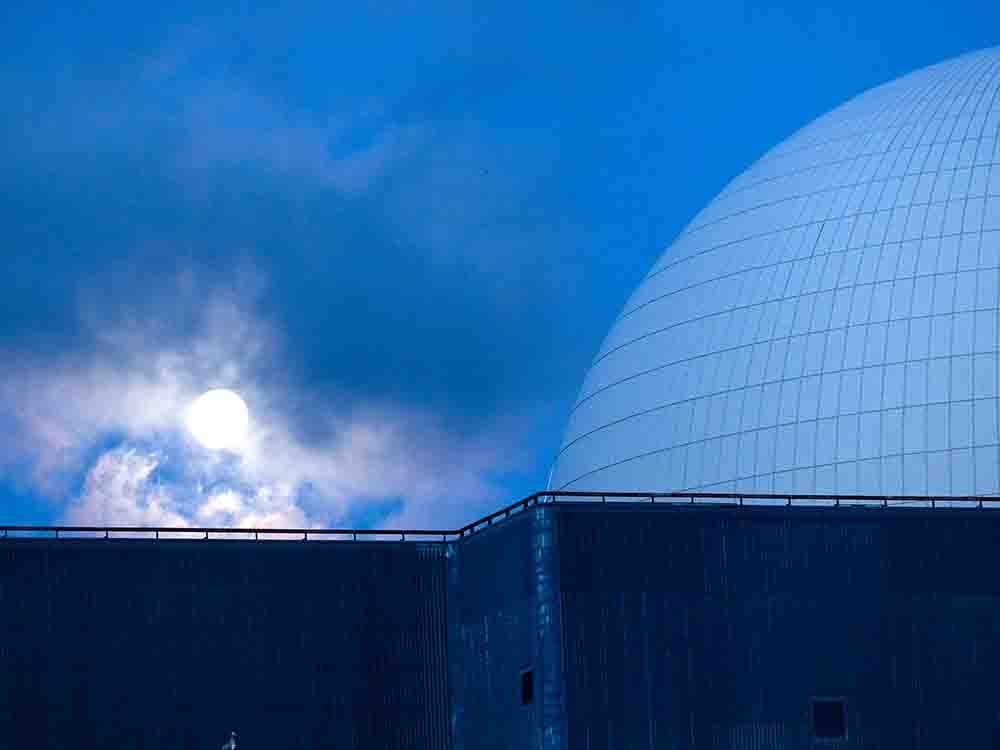Business
Growing Support for Nuclear Power as Renewable Energy Faces Challenges

In her recent book, Atomic Dreams, journalist Rebecca Tuhus-Dubrow highlights the increasing acceptance of nuclear energy as a viable source of clean electricity. As advocates promote the notion that nuclear power is “split, don’t emit,” Tuhus-Dubrow also critiques the environmental movement’s historical opposition to nuclear energy, which has posed challenges in addressing climate change effectively.
Opposition to nuclear power has been a cornerstone for groups such as Greenpeace and Friends of the Earth. Tuhus-Dubrow explains that during the 1960s, these organizations adopted an “anti-nuclear ideology” that intertwined environmentalism with a rejection of nuclear energy. Before the climate crisis gained prominence, nuclear power was generally associated with catastrophic events, including meltdowns and the threat of nuclear warfare. Activists could afford to dismiss nuclear energy, given the abundance of cheap energy sources and the absence of significant concerns regarding greenhouse gas emissions.
As the 1980s and 1990s arrived with heightened awareness of climate change, environmentalists began advocating for renewable energy solutions from wind and solar to replace fossil fuels, as well as nuclear power. Nevertheless, critical questions remain about the capability of renewables to deliver consistent and reliable power. The U.S. Environmental Protection Agency has noted that renewable energy sources often face limitations, including their intermittent nature and substantial land use, along with the challenges posed by hazardous waste associated with discarded solar panels.
Tuhus-Dubrow emphasizes the necessity for reliable electricity in today’s society, stating that “it is nonnegotiable, and politicians who can’t guarantee it will pay a price.” This reality was starkly illustrated during the 2003 recall campaign against California Governor Gray Davis, which arose from widespread blackouts and escalating electricity prices. The demand for consistent energy supply has only intensified with the proliferation of digital technologies.
Recognizing this pressing need, governments in regions like Ontario and Quebec have announced plans to enhance their nuclear and hydroelectric power production. This comes at a time when Quebec faces a potential energy supply shortfall, as its electricity surplus for export diminishes. Over the last 65 years, nuclear power has established itself as a safe and dependable source of electricity, with even well-publicized incidents, such as the accident at Japan’s Fukushima plant, resulting in limited environmental consequences.
Tuhus-Dubrow argues that the risks associated with nuclear energy are trivial when compared to the dire portrayal of climate change by environmentalists. She acknowledges that while the nuclear industry has struggled with public communication, there is a growing awareness that regions relying on nuclear power, like France and Ontario, have not experienced the catastrophic outcomes often suggested. “We don’t exactly think of France as a radioactive dystopia of illness and death,” she states.
The need for a substantial reduction in carbon emissions has led to increasing recognition of nuclear power’s role. Environmentalist Ted Nordhaus notes that it is challenging to find any serious analysis advocating for an 80 percent reduction in carbon emissions that does not endorse a significant role for nuclear energy.
The environmental movement’s tendency to exaggerate the risks of climate change has had unintended consequences, as observed by Peter Teague, an adviser to the Democratic Party. Overstating the problem’s severity while presenting a limited solution set has led to skepticism among the public, which can result in perceptions of dishonesty from policymakers. This dynamic has prompted politicians like former President Joe Biden to adopt more intrusive and costly industrial policies to give the impression of comprehensive action.
Furthermore, environmentalists’ assumption that their priorities should dominate public policy, often at the expense of economic growth, has resulted in conflict within the movement. In their book The Death of Environmentalism, Nordhaus and Michael Schellenberger argue that environmental advocates often overlook the needs of non-environmental constituencies, focusing instead on what these groups can do for their agenda.
Public opinion is shifting in favor of nuclear power, driven by the recognition that electricity demand is outpacing renewable generation capabilities. Recent findings from the Pew Research Center indicate that 56 percent of Americans now support nuclear energy, a notable increase from 43 percent just four years prior. This growing acceptance is reflected in California’s decision to reverse plans to close the Diablo Canyon nuclear plant, and in Microsoft’s initiative to reopen the Three Mile Island facility, site of the infamous 1979 nuclear accident.
As the public becomes more aware of the economic implications of relying heavily on renewable energy—higher costs and potential job losses—this contrasts sharply with the narrative suggesting a seamless transition to a zero-carbon economy. The renewed interest in nuclear power suggests that future environmental and energy policies may increasingly be guided by facts rather than fear-based rhetoric.
In summary, Tuhus-Dubrow’s insights underscore a critical moment in the energy debate, where nuclear power is reclaiming its place as a substantial component of a sustainable energy future.
-

 Science3 months ago
Science3 months agoToyoake City Proposes Daily Two-Hour Smartphone Use Limit
-

 Top Stories3 months ago
Top Stories3 months agoPedestrian Fatally Injured in Esquimalt Collision on August 14
-

 Health3 months ago
Health3 months agoB.C. Review Reveals Urgent Need for Rare-Disease Drug Reforms
-

 Technology3 months ago
Technology3 months agoDark Adventure Game “Bye Sweet Carole” Set for October Release
-

 World3 months ago
World3 months agoJimmy Lai’s Defense Challenges Charges Under National Security Law
-

 Lifestyle3 months ago
Lifestyle3 months agoVictoria’s Pop-Up Shop Shines Light on B.C.’s Wolf Cull
-

 Technology3 months ago
Technology3 months agoKonami Revives Iconic Metal Gear Solid Delta Ahead of Release
-

 Technology3 months ago
Technology3 months agoApple Expands Self-Service Repair Program to Canada
-

 Technology3 months ago
Technology3 months agoSnapmaker U1 Color 3D Printer Redefines Speed and Sustainability
-

 Technology3 months ago
Technology3 months agoAION Folding Knife: Redefining EDC Design with Premium Materials
-

 Business3 months ago
Business3 months agoGordon Murray Automotive Unveils S1 LM and Le Mans GTR at Monterey
-

 Technology3 months ago
Technology3 months agoSolve Today’s Wordle Challenge: Hints and Answer for August 19









